A Movable Forest
For a hard-luck Vermont farm couple, bringing Christmas trees to the big city takes grit, perseverance, and just a touch of “secret sauce.”
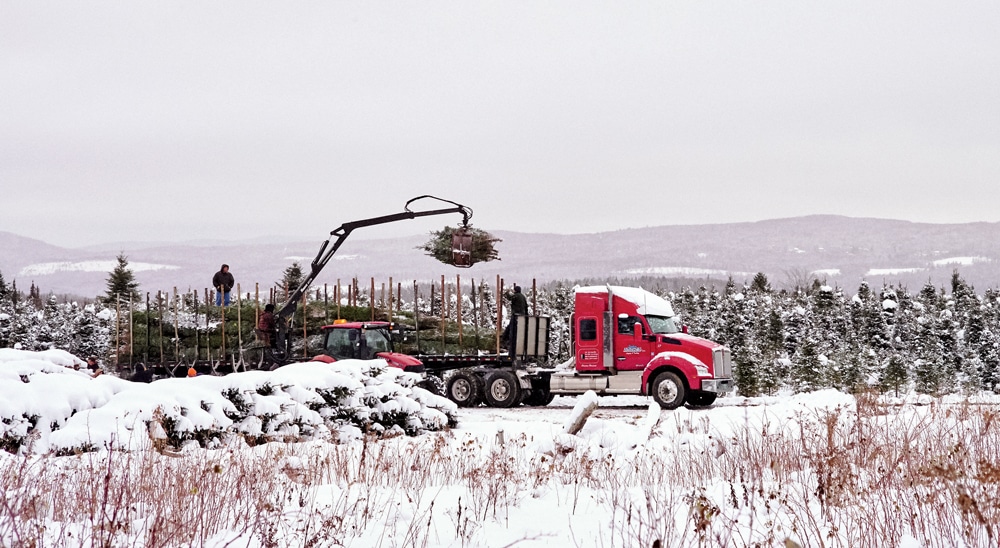
Coffee By Design | Portland, Maine
Photo Credit : Katherine KeenanBy Julia Shipley and Joe Keohane
CANAAN, VERMONT
It’s 12:30 a.m. on Tuesday, 33 days before Christmas, and fresh snow covers the remote hilltop where Melody Houle is limping back to her cabin. While fetching wood to feed the stove—the sole source of heat in the home and headquarters of her family’s organic Christmas tree business—she fell through a broken slat in a pallet lining the shed. Pain spears through her ankle and shin. Later today she and her husband, Patrick, will load up the last of this year’s balsam harvest, including a select group bound for Cortelyou Road in Brooklyn, New York. It’s the culmination of almost a decade of pruning and shearing, and many weeks of cutting and baling.
Melody’s leg is swelling fast and throbbing, and she’s concerned it could be sprained or, worse, broken—in which case, how will she stand on it day after day for a month in a small street lot in Brooklyn? The 18-wheel tractor-trailer slated to transport their trees to Manhattan will be grinding up the Houles’ long, steep, snow-choked driveway just six and a half hours from now. Furthermore, Melody hasn’t even begun packing for their extended city sojourn. She has yet to haul down the blue tub marked “NY” from the loft and double-check the essentials it contains: Christmas tree lights, black markers, a tie cutter, a tape measure, string to retie the trees, two floodlights, a safe box, power cords, a tent and rain gear, an “Open” sign, big fat chalk for writing arrows on the sidewalk, a Santa cap, a cookie tin filled with red Christmas balls (to hang on the curbside trees), a canister of free gifts for kids (Santa stickers and Star of David coins), and the little translucent sachet bags that Melody will fill with fragrant needles that fall off the trees, a gift for grown-ups.
Monday did not go as planned. Instead of putting away laundry and loading supplies into their white Lincoln Town Car, Melody, 58, and Patrick, 54, spent most of the day helping a wholesale customer whose axle broke immediately after they’d finished loading his trees. The busted rig blocked the only way into the Houles’ farm, up a sinuous two-mile dirt road. As Melody tried to track down a welder, Patrick used rope and plywood to jerry-rig the axle. Meanwhile, the season’s first snowstorm began spitting icy flakes. It was night before the trailer was finally dragged clear of the road and a welder was found to come and mend it. And the Houles still hadn’t gone to bed when Melody went out for that armload of wood and fell. Now, as she sits in a chair at the small table in the center of their shoebox-shaped cabin, Patrick kneels and places his hands gently on her ankle. Together they close their eyes and ask their heavenly father for protection and healing.
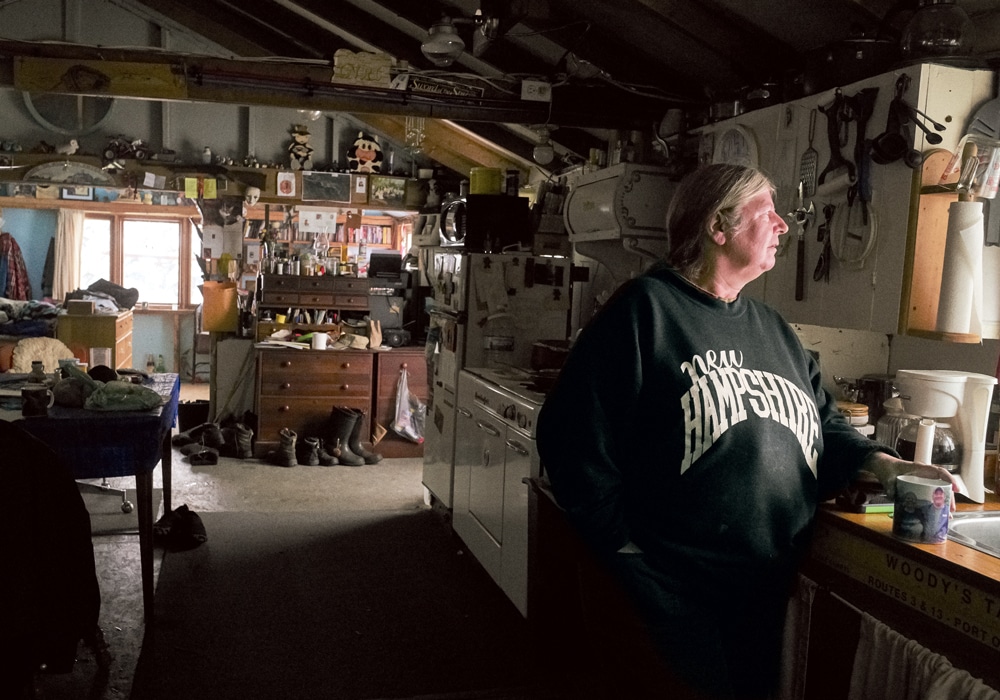
Photo Credit : Corey Hendrickson
Selling these trees is what pays the mortgage in this sparsely populated region of the state’s northeast corner, where the Houles’ closest neighbors are more than a mile away. The Houles live frugally—off the grid, with a generator, wind turbine, and solar panels for power—and, lately, without running water. Since the spring went dry three months ago, they’ve been taking showers and washing clothes with rain-water, and more recently with giant kegs of water that Patrick fills in town and hauls back to their home on Todd Hill.
The hand-painted sign on their cabin door reads, “Welcome God, Sunshine, and Friends”—and by Melody and Patrick’s estimation, these things are what deliver them from tribulations and are undoubtedly part of the miracle that landed them their coveted showcase in Brooklyn. It’s almost impossible to score sales territory in New York City, where veteran tree vendors fiercely guard their corners and curbs, but the Houles happened to spot and respond to a rare call for new vendors the instant it was posted on an online message board. This season marks their fifth year selling trees on their serendipitous lot in Brooklyn’s Ditmas Park, and the seventh year of their serendipitous business. As Lorrainy Marchessault, a Canadian-born Vermont dairy farmer and reputed father of the modern Christmas tree industry, once said, “A Christmas tree is money, but it is also something religious”—and the Houles, who more or less stumbled into tree farming, are proof of this.
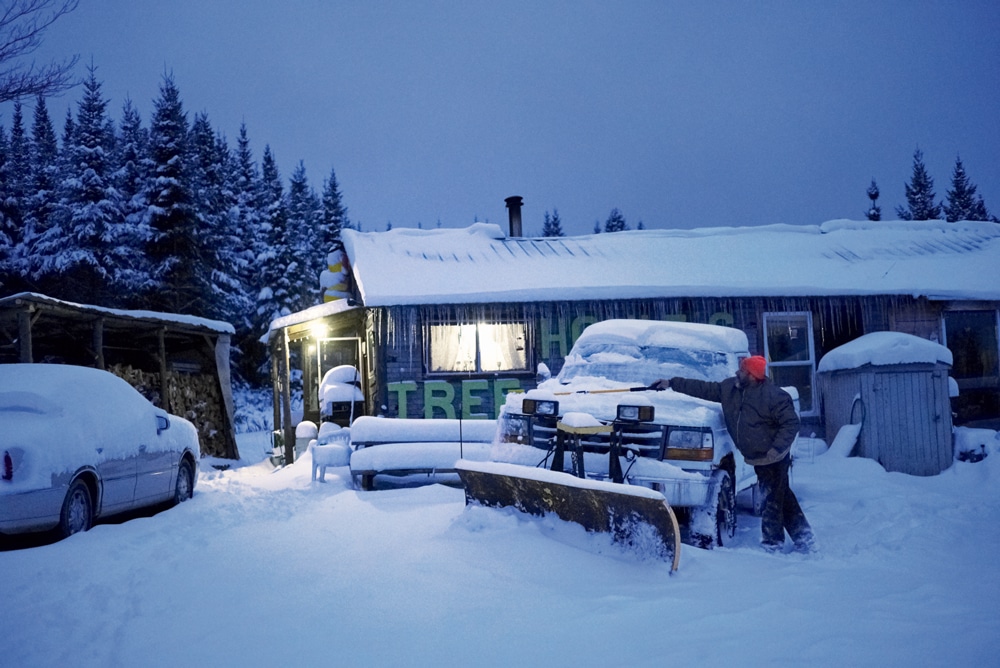
Photo Credit : Corey Hendrickson
Sixty-five years ago, Christmas tree growers weren’t vying for tiny slices of Manhattan real estate—back then, most city dwellers set up fake trees. In fact, the whole industry of Christmas tree farming was still in its infancy. In the 1950s the U.S. government began paying farmers to take land out of production; simultaneously, it subsidized the planting of Christmas trees. By 1959, Marchessault had sold his herd to plant 72,000 balsam fir seedlings. By 1969, he was cutting and loading 10,000 of “the trees you like to smell,” dispatching them to living rooms throughout the Northeast and all the way down the coast to Florida. By 1978, he’d doubled his harvest on his now-1,800-acre spread, grossing more than $100,000 a year in the business he shared with his 10 sons and daughters. By 1993, with 3,000 acres in cultivation, he’d become the largest Christmas tree grower in Vermont.
At that point, Patrick Houle was already 15 years into his tenure at the Ethan Allen plant in Beecher Falls. His mother worked there, his brothers worked there, and on Patrick’s 16th birthday he went into the factory office and applied for a job as a stock boy. Every weekday there-after he reported for work at the plant, eventually becoming an official supervisor and unofficial “MacGyver”—meaning that whenever the company needed someone to invent something to solve a manufacturing problem, he was the one they turned to.
Melody, too, signed on with Ethan Allen, joining the plant’s repair department in the late 1990s. But the Great Recession would come all too soon. In January 2009, Melody says, you could feel it; in February, they tapped her on the shoulder, led her to a room, and informed her she was being laid off. Two months later her son Michael was laid off the same way. “Now everyone in the house was in a panic,” she says. The family shut off everything but the essentials—they unplugged electronics, quit their cable service.
Today the factory sits empty, with “a lotta writing on the walls,” Melody says. She means this literally: Workers wrote snowfall amounts, birthdays, the final scores of the factory hockey team games. By the elevator, a 16-year-old Patrick had written his start date. And on August 29, 2009, a 47-year-old Patrick penciled his finish date, as the plant shut down production and laid off the remaining crew.
What were the Houles going to do? They owned a parcel, 62 acres, where they had planned to build a small house and grow food after retirement, but with no employment this dream seemed impossible. So they prayed. Patrick heard God tell him to go walk the fields of their land, and he obeyed and stared at the grasses with exasperation until he noticed little balsams poking up, looking almost as if they were in rows. Christmas trees? Patrick wondered. Was this what God had in mind?
He began adding seedling stock to what was already coming up. One day while he was out digging, along came Roland Dupont, the real estate agent who’d sold them this land years ago.
“What are you doing?” Dupont asked.
“I am planting our future,” Patrick replied.
Dupont laughed. “That’s crazy! It’s going to take 10 years to grow that future—you won’t see a nickel before then! Tell you what, let me show you a piece of land where you can sell the trees starting this year.”
Dupont didn’t say where they were going. He just drove Melody and Patrick up a steep, winding road into a bank of hills that ran north-south, like a headboard, due west of the Connecticut River. Everywhere they looked were Christmas trees—little ones, giant ones, skinny ones, fluffy ones—hundreds of thousands of trees, as far as the eye could see.
“Which one do you want?” Dupont asked.
“Which what?” Melody replied, confused.
“Parcel. Which parcel do you want? This one’s 210 acres, this one’s 112, this one’s 350,” he said, pointing.
Turns out, not long after Marchessault had died at age 82, in 2001, his children declared bankruptcy. Dupont purchased the enormous property and was in the process of selling it off. “You could harvest Christmas trees starting this year,” he told the Houles. “You could use your other parcel as a down payment.”
* * * * *
Five hours after Melody’s mishap, she is standing carefully at the sink, wearing her gray bathrobe, listening to the coffee machine gurgle. The prayers worked. Her ankle is pink but the swelling’s subsided. She places the coffee can back into the hutch—an Ethan Allen hutch—as Patrick pulls on his coat and heads out to plow the driveway so the work crew and the crane operator and the first of the day’s four 18-wheel flatbed trucks can reach the landing where the trees are heaped. “Hold on,” Melody says to Patrick as she ducks under the shirts drying by the woodstove. She grabs an ice scraper off the shelf and hands it to her husband. A look of solidarity passes between them.
Later, Patrick is downhill at the landing, where the flatbed destined for Brooklyn is backed in alongside the chest-high windrows composed of thousands of Christmas trees. Melody has counted all of these trees three times, confirmed by the orange spray-painted dot each bears on the cut face of its trunk. They lie in a pile, baled—they’re like shut umbrellas, not to be opened again till Brooklyn, where they’ll be individually shouldered into hundreds of separate apartments and hung with ornaments and garlands. Each one is the sum of a decade of the Northeast Kingdom’s sun and wind and rain, and of Lorrainy Marchessault’s legacy.
The loading crew is ready to go. They’re locals, all in their twenties except Ed, who’s in his forties. They’ve been smoking in their pickups, waiting for crane operator Ivan Belville to show. Ivan, who hails from Quebec, is in high demand right now, going from farm to farm all over northern Vermont and Canada, grabbing trees with his crane, hoisting them like a clutch of straws, and depositing them onto flatbeds. When he finally chugs up the hill around 8 a.m., the crew jumps into action. Approaching the windrow in teams, Brandon and Lance and the two Danielles take turns rolling bunches of five to eight trees off the pile. They carry them like patients on stretchers and place them into Ivan’s “basket” on the ground. Then Ivan, seated on a balled-up wool shirt in his open-air cab, works his levers. His crane arm bends and clamps the trees out of the basket, then lifts them skyward and swings over to deliver them onto the flatbed, again and again.
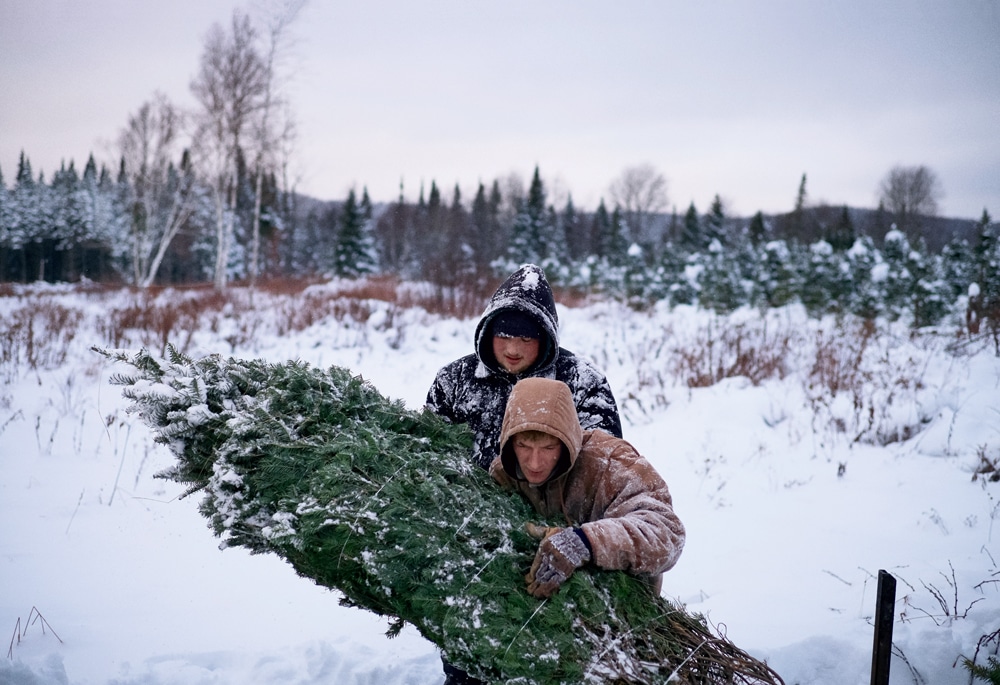
Photo Credit : Corey Hendrickson

Photo Credit : Corey Hendrickson
Meanwhile, Ed and Tyler cling to the flatbed’s side stakes as they stand on the newly loaded trees, tamping them down, rising higher and higher on the payload of balsams. The air is cold but pungent, spiced with the trees’ fragrance as the flatbed fills to capacity. Throughout their hour of work, a brisk, wet wind blows and the snow flies sideways. Now the semi driver, Mike Marchand, mounts the flatbed to strap down his load for transport. The crew members retreat to their trucks to warm up.
Throughout, Patrick has been half supervising and half fielding calls on his cellphone. The news is not promising: The next semi is stuck halfway up the Houles’ driveway. It doesn’t have chains on its tires, which means it will be difficult to extract and pull farther up the hill. Furthermore, the flatbed has no side stakes, so Patrick will have to scrounge his farm for every two-by-four he’s got—or anything that can be cut into a two-by-four.
Patrick gives Ivan instructions in French about how to use his crane to extricate the stuck semi. Next he tells the loaded-to-go, Brooklyn-bound driver, Mike, to stay put. Then he calls Melody, who is in town fetching last-minute items for their trip. He asks her to swing by the lumberyard and “just grab whatever they have.” When she wonders aloud how to fit all the two-by-fours into the Town Car, he realizes he’ll have to go off-road with his plow truck to squinch around the stuck semi and swap vehicles with her so she can fetch the lumber. First, though, he needs to see if he has enough chainsaw fuel. Then he’s up raiding his scrap wood stash when his phone rings again. It’s his contact in Brooklyn, calling with regrets that the Houles have access to only one-third of their regular lot this year. “Well, we’ll make do,” he tells her as he inspects a potential stake and pitches it aside (rotten).
It’s still Tuesday, 33 days before Christmas, and it’s only 10:30 a.m. when Mike Marchand’s tractor-trailer eases down off Todd Hill and cruises into the river valley flats. His is the first load of some 3,000 trees that will have coursed out of these hills by dusk—a transient forest. He stops short at the intersection with Route 102. He gets out of the cab and tugs one last time on his straps; he unhitches his tire chains and stashes them; he makes a final survey of his load, eyeing the orange- spotted butts jutting from the back. Then he climbs back into the truck. Later today, Melody and Patrick will gas up the Lincoln and follow their trees to the city. Right now, Mike’s tractor-trailer faces due east, where the Connecticut River forms the watery border. Beyond it basks New Hampshire. Canada looms off to the left. Mike taps the accelerator. He and every tree bound for Cortelyou Road turn right. —Julia Shipley
BROOKLYN, NEW YORK
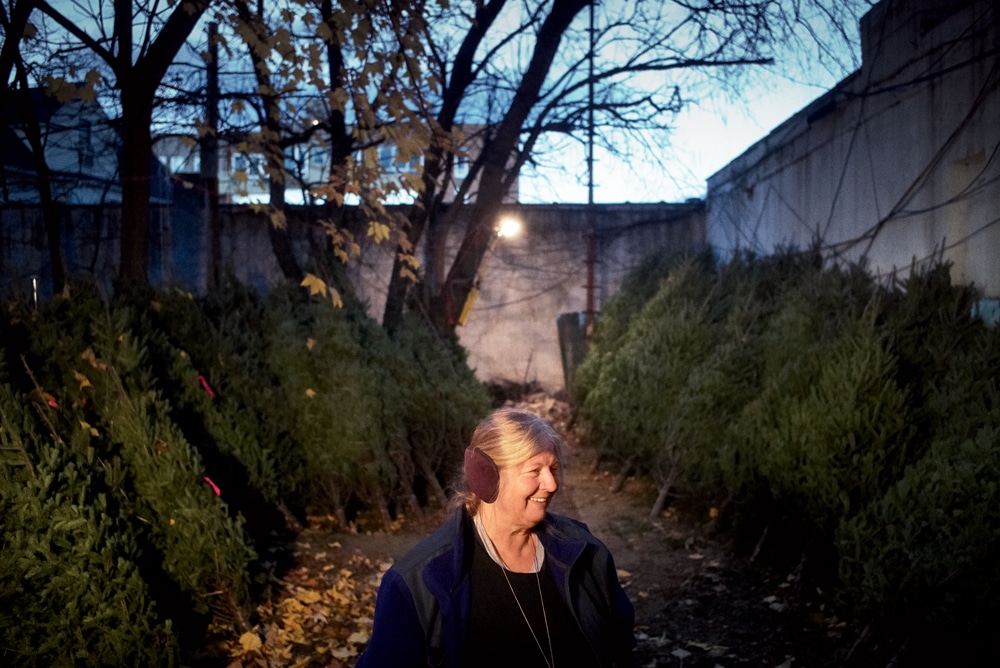
Photo Credit : Corey Hendrickson
“They are moving.”
Melody Houle takes a drag of her cigarette, which she’s lit off a Bic that hangs upside down from a string around her neck. She’s standing in one of those neglected lots you find all over the outer boroughs of New York City, muddy and uneven, strung with random wires of obscure purpose and littered with rusted detritus. And the fact that these unlovely things have been made visible is a source of triumph for the Houles. It means the trees that hid them even a week ago are selling. By Saturday, December 10, there are only 70 left, down from 300. They are moving.
A father walks into the lot with a boy slumped on his shoulders. He looks around and zeroes in on a tree. A fat seven-footer.
“What do you think?” he says.
The kid slumps further.
“You’re indifferent,” the father says. They keep looking.
The lot is behind a craft shop on Cortelyou Road in Ditmas Park in Brooklyn. It’s a neighborhood best known for its stock of what locals call “detached houses”—recognized outside New York City as simply “houses”—but there are attached apartment buildings and attached townhouses and attached everything elses, too. Ditmas Park is gentrifying, as the wave of money surges ever eastward across the Borough of Churches, but it remains a diverse place. The Houles’ stand is a stone’s throw from a guitar shop, a check-cashing operation, a hip restaurant, an Islamic school, a Pilates studio, a Mexican diner, a Dominican hair salon, and Shabuj Grocery, which advertises itself as “Bangladeshi, Indian, Pakistani & American,” and under whose awning passes a family of Hasidic Jews out for a Saturday stroll.
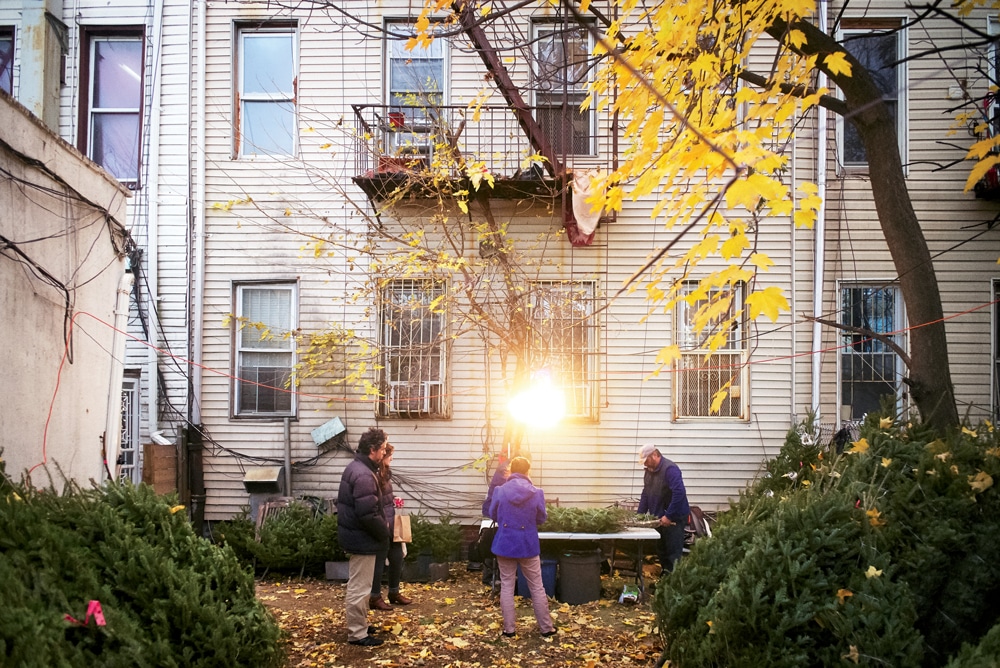
Photo Credit : Corey Hendrickson
This is a perfect lot, Melody says. The stone walls on two sides keep the trees cool, and the moist dirt keeps them hydrated. And the gate locks, which means she and Patrick can go back to their Airbnb at the end of every night and not have to worry about whether any stock will go missing. Despite the native condition of the lot, it’s festive, heavy with pine scent.
A couple step in and look around. Cassidy and Adam. They’ve just moved in together. Last year it was only Adam, his cat, and a small Christmas tree. “Every time I came home, the tree was on the floor,” he says. This year, with Cassidy’s two cats in the mix, the threat is multiplied. “I saw a YouTube video of cats fighting Christmas trees,” Adam says. “So I’m pretty excited. It’s a new adventure for them.”
“I’m so excited,” says Cassidy.
Ditmas Park has a robust Jewish population, and Melody reports that she’s been seeing more mixed couples coming in since last year. Adam and Cassidy are one of those.
“He’s pretty new to Christmas,” she says.
“I’m Jewish,” he says. “I was raised Orthodox.”
“So we’ve been doing Christmas stuff,” she says. Getting a tree, watching Christmas movies, getting tickets to Handel’s Messiah at Carnegie Hall.
“It’s pretty immersive,” he says. “All the Looney Tunes parodies make sense now.”
They buy a six-footer for $60.
Not everything is for sale back here. Melody maintains a small tin of coins and stickers (Christian- and Jewish-themed) for the kids. “Something for everybody,” she says. There is also a tree decked with little silver sachets full of pine needles. “Sometimes you can tell that somebody needs their day brightened,” Melody explains. “You hand them one of those, and they get teary-eyed. That’s what it’s all about.”
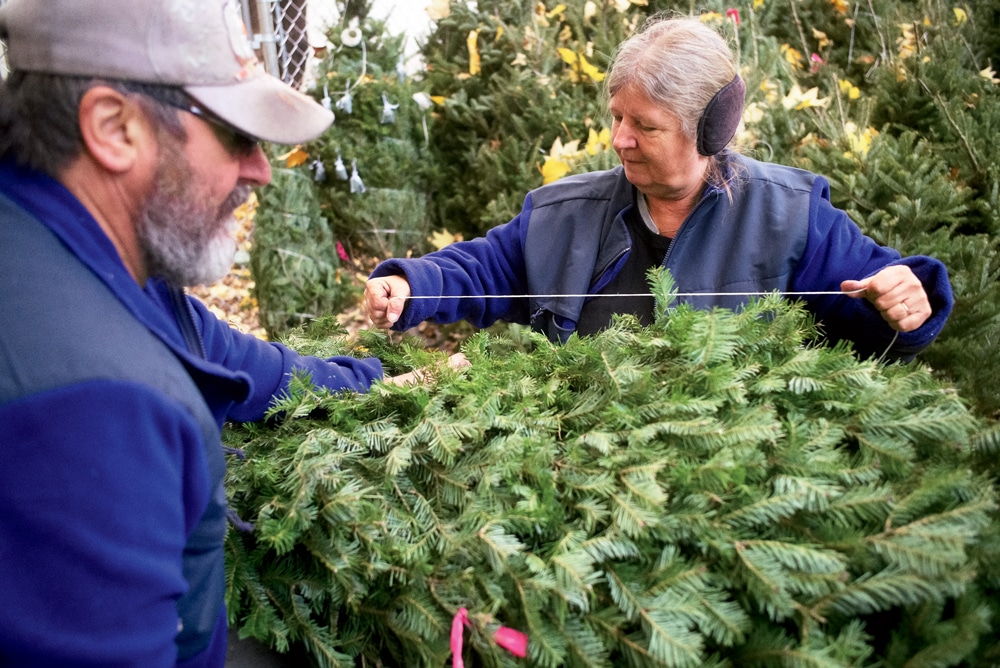
Photo Credit : Corey Hendrickson
There are also three gnarled, patchy little trees—“Charlie Brown trees,” Patrick says—propped up by the entryway in a couple of cinder blocks. One sold yesterday to a young woman. She didn’t have room for a proper tree. “She wanted a bit of the Christmas spirit, and that was the one for her,” he says.
Another father stands before a seven-footer on the corner.
“How much is this?”
“Seventy,” Melody says.
“Well … I only have 60.”
“We take cards.”
The man deflates slightly, his hopes of bringing home both a tree and a tale of successful bartering dashed, and slinks off to the six-footers. He finds a suitable specimen and turns to his daughter, who is wearing a long red knit cap.
“What do you think, June?” he says.
“I like this tree,” she replies. Then she peers curiously at Patrick. “Who is this one?”
“That’s Patrick,” says Melody, offering June a treat from her tin box. “My husband.”
Off they go. Patrick grabs a tree and lays it on the table. “Let’s give this one a haircut,” he says and grabs the chainsaw. Melody is chatting with a customer, and her hand rests a few inches from where Patrick is going to cut. He takes it and gently places it safely away from the blade.
“They’re selling fast,” Melody is saying. She thinks people are getting them earlier this year because they know these trees will last. “They know the secret sauce works.”
The secret sauce, by the way, is Sprite and bottled water. Not city water, which contains chloride. One customer after another attests to its potency. One woman, Hyacinth, says her tree lived well into the spring last year, remaining fully decorated. Finally a friend told her, “Get rid of the Christmas tree! I can’t stand it! It’s March!” She consented, she says, but not without some regret.
In roister two boys, clad in parkas, caps, and scarves, singing “We Wish You a Merry Christmas.” With them is their mother and a small girl in a white cat hat with a fresh tear on her cheek. They get a six-footer. The boys are determined to carry it home. The mother is skeptical but willing to give them a shot (if only, she confides, because it might be hilarious). Patrick ties it up, and the boys grab it roughly and set to dragging it out. Their sister, meanwhile, is nowhere to be seen.
A faint voice sounds from the other side of the gate.
“Mama, I don’t want to get hurt,” the voice says.
“I don’t want you to get hurt, either,” says her mother.
“I don’t want to get hurt by a Christmas tree,” the girl says.
“Then stay out of the way!”
More customers, more trees. Men, women, straight, gay, black, white, young, middle-aged. People who went too big last year and touched the ceiling, people harboring regrets at not getting close enough to the ceiling. Most are repeat customers, because of the trees and the Houles. “They’re very natural and authentic,” one says. “It’s not about business. It’s about making sure you have the cheeriest Christmas.” Another tells the Houles, “I always get them from here, and I love you guys, and they’re perfect.”
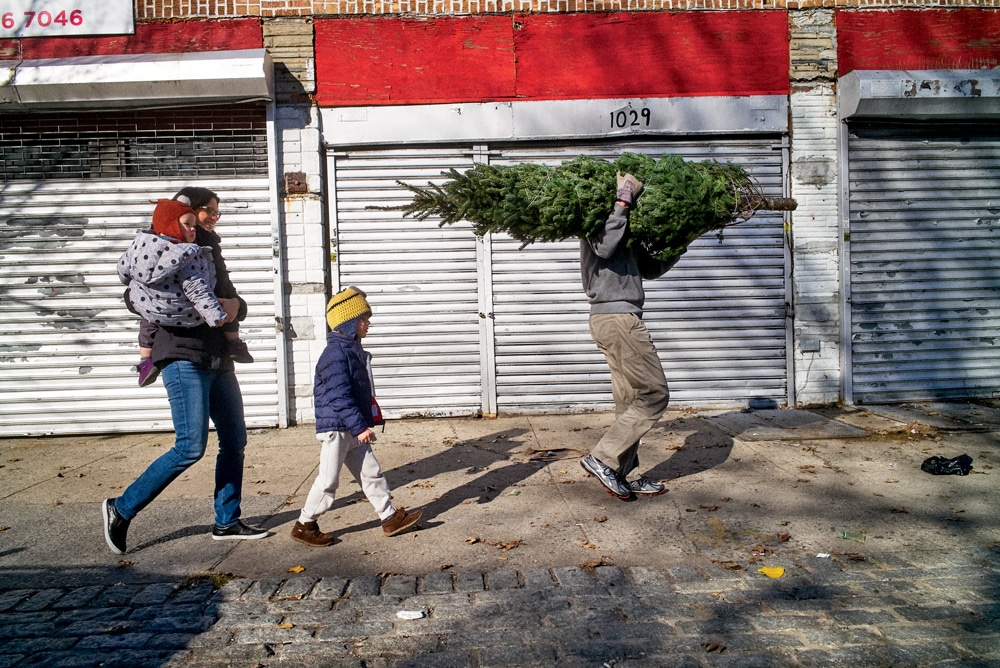
Photo Credit : Corey Hendrickson
“It’s the secret sauce,” Melody tells him.
They are moving. At this rate, they’ll sell out by the 11th or 12th, a week and a half earlier than usual. “Maybe we’ll have time to actually see the sights,” Melody says. “We’ve never done it. Patrick wants to see the Statue of Liberty and Ground Zero.”
“We don’t get to see it unless it’s on TV, and it’s never the same,” he says. He also wants a dirty-water hot dog.
A severe and studious-looking middle-aged man enters, wearing thick-rimmed glasses, a black coat, and an air of purpose. “I’m looking for a nine and a half,” he says, “and the girth can’t be—”
“Not too big?” says Patrick. He shows him a tree.
“Do you have anything just like it, but a foot taller? Sorry: difficult customer.”
Patrick pulls out a bigger one.
“I like this one,” the man says. “Unless you have one taller.”
Patrick produces one taller.
“That’s too tall,” the man says. He returns to the previous one and starts nodding. “I love this one,” he says, finally. “That’s the one. That’s the one.” It’s a $90 tree, but he has only $70. He gives them what he has as a down payment, and says his partner will come with the rest.
“Pardon me,” he says. “I need to call for help.”
He rushes out, and the Houles laugh and kiss in the lot. Five minutes later a head peeks through the gate: “Hello? There’s a crazy man here who just bought a tree?”
Another sale, another young couple. Melody asks the buyers if they remember about the watering.
“Oh, we need Sprite, don’t we?” the young woman says. As Patrick ties up the tree, she says, “We didn’t think you’d be back this year.”
“We’re tryin’,” says Melody.
A tree is selected by Ken, a painter. A repeat customer. But when Patrick gets the tree on the table, he notices the trunk is crooked and suggests Ken pick another one. While he does, Patrick discards the crooked one in the corner. Ken settles on a non-crooked tree—to be picked up Sunday—and says, “See you tomorrow, my friends!” Then he turns to a stranger and indicates the dwindling stock on the lot: “I hope it brings them…” and he makes a concerned gesture that can only be read as overdue good fortune. “They’re sweet,” Ken explains.
They are moving.
“This is our best year yet,” Melody says. “I hope we’re on a roll.”
A French florist comes in. She complains that all her customers in town are incredibly demanding, and all the trees her firm bought to sell them this year are thin. It’s been a nightmare. “I’m a little less difficult on my own tree,” she explains. “I just want to throw some lights on and call it a day. It’s the spirit of the season, not whether it’s perfect.”
“It’s Mother Nature,” Patrick says. “It’s not a perfect world.”
Of course, now someone else wants the crooked tree. A pretty 20-something with bangs and an olive parka has found it. Melanie. Her boyfriend, Ron, in a leather jacket, hoodie, and sunglasses, is less enthusiastic. “You’re stuck on this one,” he tells her.
“I don’t know,” she says. “I just like him. He’s special because he’s crooked.” She thinks about it. “And probably because they’re telling me we shouldn’t have him.”
They buy him.
“You remember how to water?” Melody says.
Off they go.
“Not many Mohicans left, huh?” Patrick says.
Who knows, Melody says. They might even sell out tomorrow.
“It’s a big blessing,” says Patrick. “We get to enjoy New York.”
“It’ll be different,” Melody says.
Later, as Patrick is away feeding the meter, she takes a smoke break. “It might be a honeymoon,” she says. “We never had a chance to do that, either.”
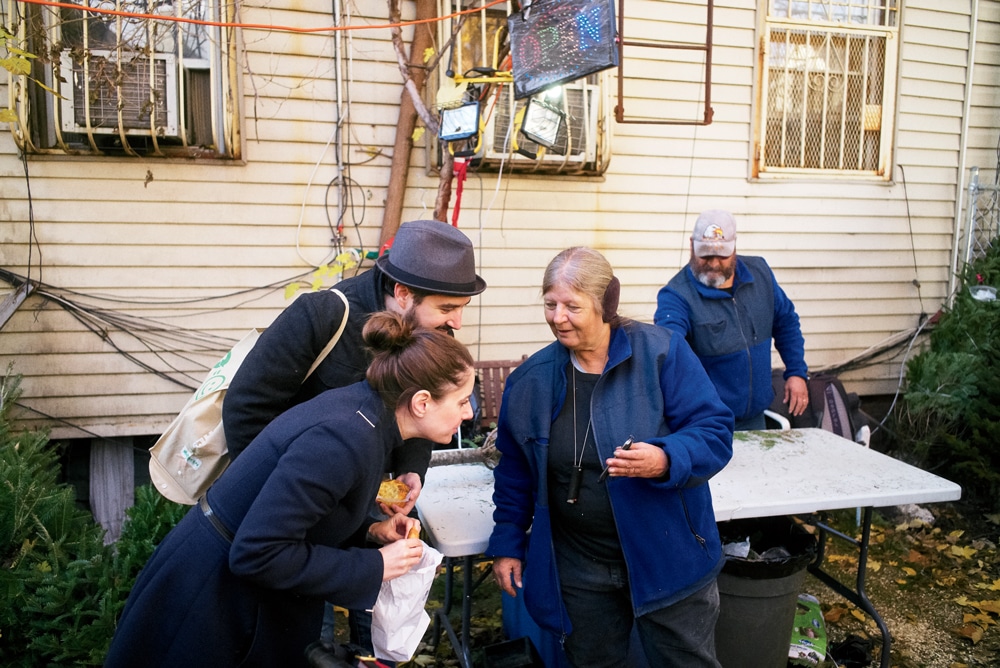
Photo Credit : Corey Hendrickson
The next young family, repeat customers, have brought their own dolly with them. The mother’s name is Kelly. Her father bought the dolly for them, she says. Kelly asks Melody where their Airbnb is, and they get into Airbnb war stories, as people do. Kelly tells her that her father got an Airbnb last time he was in town, but the ceiling was so low he kept hitting his head on the pipes. “So he went out and bought a bike helmet,” she says. “He’s a little kooky.”
It has started to snow. The December chill sinks in as dusk approaches. Kelly and her family load the tree onto the dolly and turn to go. Before they do, Melody gives Kelly a big hug. “Bye-bye, dear,” she says. “Have a merry Christmas.” They go.
A minute later, one of the kids returns and gives Melody a five.
“Thank you so much,” he says.
* * * * *
On a damp, cool Monday afternoon, there’s only one tree left, and it’s been leaning against the dirty white wall for hours. Even the last crabbed little Charlie Brown tree is gone, claimed by “a little boy so happy to have his own tree it wasn’t funny,” Patrick says. The hours crawl by. It closes in on 3 o’clock. “It’s time for you to take it out to the street and dance with it,” Patrick suggests.
“I suppose you could put it out front with a sign that says ‘Last Tree,’” says Melody.
They carry it out to the sidewalk and lean it against a bike rack. Patrick waits in the car. His hip is bothering him. At about 4 p.m., a friendly couple come by. Alec Betterley, a music therapist, and Nicole Lenzen, a nurse. They are newlyweds—this is their first married Christmas—and they just returned this afternoon from Texas, where they visited his mother. They’re tired, they’re busy—this is their only day off, which means it’s the only chance they’ll have to buy a tree—and buying a tree, for these two, is usually fraught. “It’s actually one of our most argument-prone days,” says Alec.
“We have a hard time picking a Christmas tree,” says Nicole.
Not this year. This year, peace will reign. There are no choices. There’s just the one. A lovely seven-footer. They pay out on the sidewalk and chat with the Houles. But it’s getting cold, and it’s getting toward night. Patrick and Melody congratulate the couple and wish them a merry Christmas. As they all prepare to part ways, only one thing remains to be said.
“Now,” says Melody, “you remember the watering instructions?” —Joe Keohane
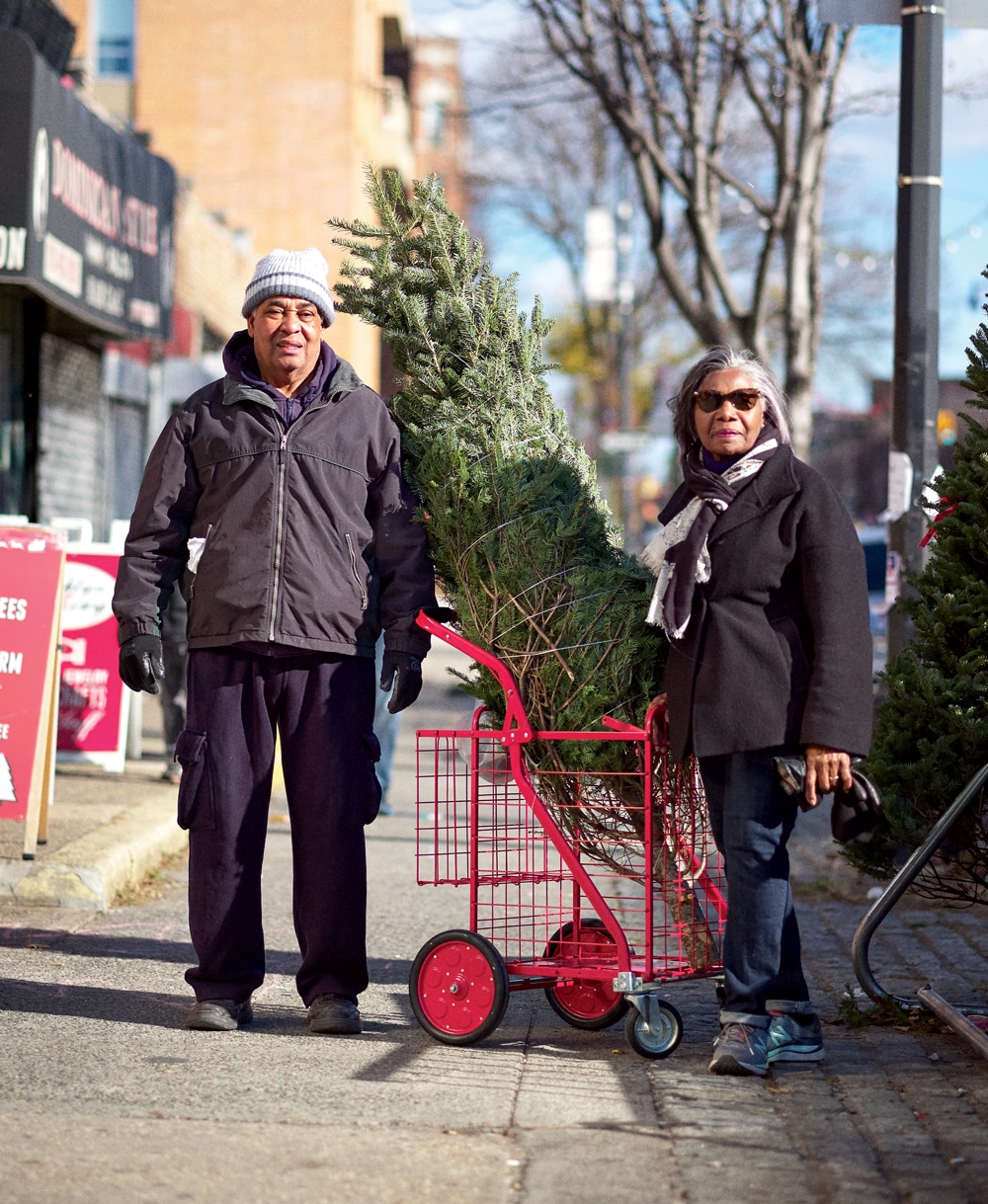
Photo Credit : Corey Hendrickson








This is one BRAVE couple. Hard to remember the 2008’s on for years.
I feel like I just spent time with them! Excellent story and very well written. I am a Texan through and through but the last couple of years I hear somewhere in New England calling me! Will just have to figure out where. So glad I found Yankee magazine or it may have even found me.